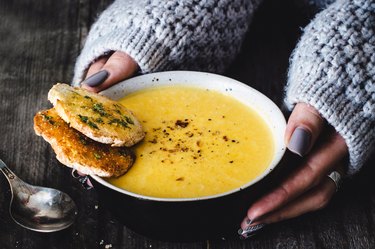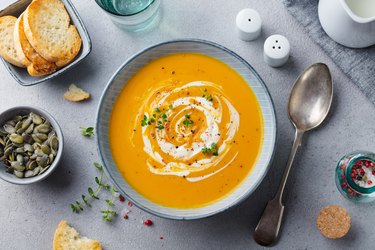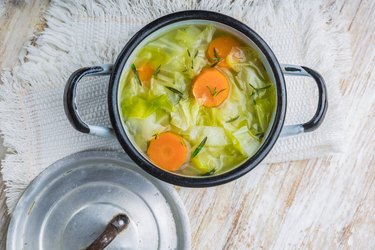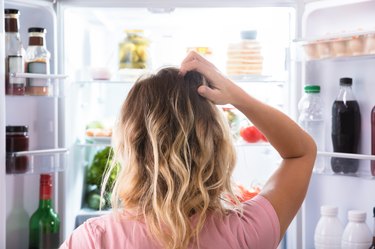
The soup diet has been around for ages. So can it really help you lose weight, or is it just an outdated fad diet?
Here's a look at what it's all about and how it works, how much weight you can really expect to lose and whether there are any potential downsides. (Hint: There are a bunch.)
Video of the Day
Video of the Day
What Is a Soup Diet, Exactly?
The soup diet is basically just what it sounds like: A diet consisting all or mostly of soup. Specifically, broth-based vegetable soups, like cabbage soup. Some people following this type of diet just eat soup for each meal. Others will add in a source of lean protein (like grilled chicken breast or beans) or a serving of fruit or veggies.
Devotees like the soup diet because it's super-low in calories. But it's not the kind of thing you're supposed to do forever. Instead, the soup diet is really just intended to be a quick way to lose a few pounds or jumpstart a more sustainable weight-loss diet. Most people only follow it for seven to 10 days.
Different Types of Soup Diets
The main rule of the soup diet is sticking with a broth-based vegetable soup for seven to 10 days. Some people literally only eat soup, while others incorporate small amounts of lean protein or additional veggies or fruit to help fill them up. Beyond that, the type of soup you have is pretty much up to you. Some people stick with:
1. The Cabbage Soup Diet
It's the best-known variation of the soup diet, where you eat cabbage soup for seven days. Some proponents also allowed for eating small amounts of fruits and veggies, beef, chicken and brown rice.
2. The Canned Soup Diet
Not up for making your own soup? This version of the soup diet swaps homemade for canned. You just have to make sure to stick with broth-based canned soups (like a simple veggie soup) over ones made with high-calorie ingredients like cream or cheese.
3. Other Soup Diets
You don't have to stick with cabbage or canned soup. Any type of broth-based vegetable soup can work for the soup diet. Planning on incorporating some lean protein into your diet plan? You could add beans, chicken or turkey to your soup as well. Again, just make sure the soup is broth-based, not cream-based.
Soup Diet Recipes to Try
Good news: There's no one official soup diet recipe. So you can pick whatever veggie-loaded, broth-based soup sounds tastiest to you.
Here are a few options:
- Slow Cooker Chicken, Kale, and Sweet Potato Soup from Real Food Whole Life
- Chicken Vegetable Soup from Feel Good Foodie
- Tomato Cabbage Soup from Feel Good Foodie
- White Bean Soup from Chelsea's Messy Apron
- Vegetarian Split Pea Soup from Chelsea's Messy Apron
What Can You Eat on a Soup Diet?
The main component of a soup diet is broth-based veggie soup — you'll eat that for breakfast, lunch and dinner. Some people opt to add in a few additional low-calorie foods to help them stay fuller and more satisfied.
These could include:
- Additional veggies
- Fresh fruit
- Lean protein like chicken, tofu or beans (either in the soup or on the side)
- Brown rice (either in the soup or on the side)
Basically, everything else is off-limits. That means while you're on the soup diet, you can't eat:
- Cream-based or cheesy soups, which are higher in calories than broth-based soups
- Starchy foods like bread, pasta, potatoes or white rice
- Baked goods, desserts or foods with added sugars
- Dairy foods like milk, yogurt or cheese
- Fatty meats like beef, pork or other processed cuts
Can You Lose Weight (and Keep It Off) on the Soup Diet?
A quick Google suggests that the soup diet could help you lose 20 pounds. Truth is, you'll probably lose a little bit of weight — and then regain it after the diet is over, says registered dietitian Erin Palinski-Wade, RD, LDN.
Soup can definitely be a helpful food for weight loss. One April 2014 British Journal of Nutrition study of more than 10,000 adults found regular soup-eaters tend to weigh less (and take in more fiber, vitamins and minerals) compared to people who don't eat much soup.
Why? Broth-based soups have a high amount of water, so they're often low in calories. (You'll get just 91 calories in a cup of cabbage soup, for instance, according to the USDA.) But all that liquid has another benefit.
"The volume of broth-based soups provides a feeling of fullness," Palinski-Wade says.
The problem is most of the weight you lose on the soup diet isn't body fat — it's water weight. Eating a super-low calorie diet for seven to 10 days will cause your body to break down stored energy, or glycogen, in your muscles.
"Your body will use the glycogen for energy because it's not getting enough from your diet to meet your energy needs," says registered dietitian nutritionist Martha Lawder, RDN. "Since glycogen is stored with water, when it's accessed, the water condensates and leads to water weight loss."
As a result, the scale might read a few pounds lighter, but the lower number won't stick around for long. As soon as you stop the soup diet and go back to eating your usual calorie amount, you'll regain the lost water — and weight — within a day or two, Lawder says.
How Much Weight Can You Lose on a Soup Diet?
Over seven to 10 days, which is the suggested duration for a soup diet (not just soup for two weeks), most people could expect to lose between 1 and 5 pounds, Palinski-Wade says.
Is the Soup Diet Healthy?
Eating soup can be part of a healthy weight-loss plan. But most experts agree eating only soup for seven to 10 days isn't the best idea.
Cons
"Soup shouldn't be the only thing you eat if you want to lose weight and actually keep it off," Palinski-Wade says.
1. It's a Crash Diet That Cuts Your Calories Very Low
A soup-only or liquid-only diet doesn't have enough calories to sustain you for more than a week or two. A too-low calorie intake can zap your energy and, over time, actually make it harder to lose weight.
2. It Doesn't Deliver Long-Lasting Weight Loss
"Putting yourself in an extreme calorie deficit is unhealthy," Lawder explains.
Cutting your calories too low forces your body to burn lean muscle tissue for energy. "And if you lose muscle, that slows your metabolism and makes further weight loss difficult," Palinski-Wade adds.
Once you go back to eating a normal amount of calories, you'll gain the weight right back.
3. It's Not Nutritionally Balanced
To make matters worse, eating a super-limited diet can mean you miss out on important vitamins and minerals found in other foods, per the Mayo Clinic. And that could eventually lead to nutrient deficiencies.
4. It Could Be High in Sodium
And while we're talking about nutrition: If you're following a canned-soup diet, you could be taking in a lot of salt, because canned soups tend to be high in sodium.
5. Eating Just Soup Can Make You Feel Deprived
There's also the issue of deprivation. "At a certain point, you may get sick of eating soup only, and that's when binge eating can occur," Palinski-Wade says.
Pros
That's not to say brothy vegetable soups are bad.
1. You May Get More Fiber
Including soup can improve the overall quality of your diet, thanks to fiber- and nutrient-rich ingredients like veggies and beans, per the above-mentioned study in the British Journal of Nutrition. The key is enjoying soup as part of a balanced diet instead of eating just soup.
2. You May Experience Modest Weight Loss
"Try replacing one or two meals a day with soup and round out the rest of the day with fruits, veggies and lean protein. That'll still help you lose weight but give you more variety," Palinski-Wade says.
Still Want to Try a Soup Diet?
Most experts don't recommend it — for anyone. But if you really want to try the soup diet to jumpstart weight loss, here are a few tips worth keeping in mind.
- Do a more moderate soup diet. Consider having soup for one or two meals instead of all three meals each day.
- Keep it short. Especially if you're eating soup for three meals a day, don't follow the soup diet for more than 10 days.
- Switch it up. Try rotating between a few different soup recipes so you don't get bored.
- Watch your sodium. Doing the canned-soup diet? Pay attention to your sodium intake. "Ideally you want less than 500 milligrams of sodium per serving of soup," Lawder says.
- Journal of the American Dietetic Association: "Eating Slowly Led to Decreases in Energy Intake Within Meals in Healthy Women"
- Harvard Health Publishing: "Exercise and weight loss: the importance of resting energy expenditure"
- British Journal of Nutrition: "Soup Consumption Is Associated With a Lower Dietary Energy Density and a Better Diet Quality in US Adults"
- USDA: "Cabbage soup, home recipe, canned or ready-to-serve"
Was this article helpful?
150 Characters Max
0/150
Thank you for sharing!
Thank you for your feedback!


